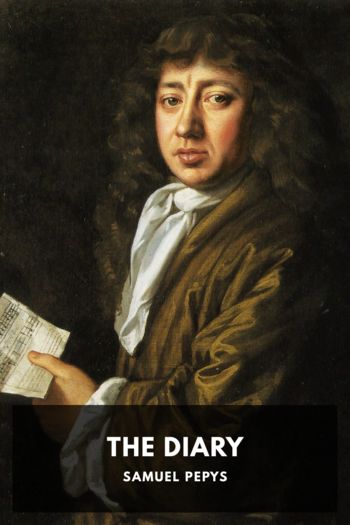The Diary - Samuel Pepys (red white and royal blue hardcover txt) 📗

- Author: Samuel Pepys
Book online «The Diary - Samuel Pepys (red white and royal blue hardcover txt) 📗». Author Samuel Pepys
Charles Sackville, Lord Buckhurst, eldest son of Richard, fifth Earl of Dorset, was born January 24th, 1638. He was a volunteer with the fleet in 1665, when he wrote his famous song beginning
“To all ye ladies now at land
We men at sea indite.”
In 1674, by the death of his uncle, Lionel Cranfield, Earl of Middlesex, he came into possession of a considerable property, and in the following year was created Earl of Middlesex. In 1677 he succeeded his father as sixth Earl of Dorset. He was a favourite companion of Charles II and of William III, and a patron of literary men. He died January 29th, 1707. ↩
Afterwards Sir Martin Beckman, many of whose plans are in the British Museum. He became chief engineer, and was knighted March 20th, 1685. The map of Tangier here mentioned is in the collection of George III at the British Museum. —B. ↩
Genest gives the cast, on the authority of Downes, as follows (English Stage, vol. i, p. 42): Romeo—Harris, Mercutio—Betterton, Juliet—Mrs. Saunderson. The Hon. James Howard turned Shakespeare’s tragedy into a tragicomedy, and apparently introduced a new character, Count Paris’s wife, which was taken by Mrs. Holden. But this apparently was produced at a later date, when, according to Downes, Shakespeare’s original and Howard’s travesty were acted alternately. ↩
Lord Braybrooke wrote, “This reminds me of a story of my father’s, when he was of Merton College, and heard Bowen the porter wish that he had £100 a-year, to enable him to keep a couple of hunters and a pack of foxhounds.” ↩
Although fumage or smoke money was as old as the Conquest, the first parliamentary levy of hearth or chimney money was by statute 13 and 14 Car. II, c. 10, which gave the king an hereditary revenue of two shillings annually upon every hearth in all houses paying church or poor rate. This act was repealed by statute I William and Mary, c. 10, it being declared in the preamble as “not only a great oppression to the poorer sort, but a badge of slavery upon the whole people, exposing every man’s house to be entered into and searched at pleasure by persons unknown to him.” ↩
Moorfields were first drained in 1527, and walks were laid out in 1606. In the following year Richard Johnson wrote The Pleasant Walks of Moore Fields. ↩
In Cornhill, where Pope’s Head Alley still exists. See June 20th, 1662. There was a Pope’s Head tavern in Chancery Lane, see March 22nd, 1659–60. ↩
Dr. Robert Creighton (born at Dunkeld in 1593), educated at Westminster School and Trinity College, Cambridge. In 1625 he was made Professor of Greek, and in 1627 succeeded his friend George Herbert as Public Orator, holding both offices until 1639. When Pepys heard him, Creighton was Dean of Wells. In 1670 he was consecrated Bishop of Bath and Wells. He died November 21st, 1672. His son, of the same name, was elected Greek Professor of Cambridge in 1662, and died at Wells, February 17th, 1733–4. The father and son have been sometimes confounded. ↩
She is called in the State Poems “the Monkey Duchess.” The duke was Master of the Horse to the king. —B. ↩
Afterwards Duke of Montagu. See ante, note 1302. ↩
Sir Thomas Allen, Bart., Lord Mayor, 1660. ↩
Hume states that Downing was in early life chaplain in Okey’s regiment, and Pepys’s reference to ingratitude would seem to allude to this. (See note 55.) ↩
[“And hail the treason though we hate the traitor.”] On the 21st Charles returned his formal thanks to the States for their assistance in the matter. —B. ↩
John Okey, Miles Corbet, and John Barkstead, three of the regicides executed April 19th following. —B. ↩
The President Hénault mentions a similar speech made by Lockhart, in France.
“Un Ecossois, nommé Lockart, ambassadeur d’Angleterre en France, sous Cromwell, dont il avait epousé la nièce, et qui le fut aussi depuis, sous Charles II, disoi qu’il n’étoit pas considéré en France, en qualité d’ambassadeur du roi, comme il l’avoit été du tems de Cromwell; cela devoit être parcequ’il y avoit bien de la différence entre celui qui obligea la France à prendre Dunkerque pour la lui remettre, et celui qui revendit cette place à la France quand il fut remonté sur le trône.”
Hénault’s pithy remark expresses the truth. Nothing shows the degradation of Charles in a more striking light than this coincidence of opinion in two ambassadors. The first edition of Hénault does not contain this passage. —B. ↩
Charles, when residing at Brussels, went to the Hague at night to pay a secret visit to his sister, the Princess of Orange. After his arrival, “an old reverend-like man, with a long grey beard and ordinary grey clothes,” entered the inn and begged for a private interview. He then fell on his knees, and pulling off his disguise, discovered himself to be Mr. Downing, then ambassador from Cromwell to the States-General. He informed Charles that the Dutch had guaranteed to the English Commonwealth to





Comments (0)